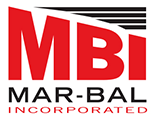Building with Composite Materials
Mar-Bal, a leader in thermoset composites, produces composite materials for construction to fill the growing need for lighter-weight materials used in the wide-ranging, diverse construction industry. The first large-scale use of composites in construction occurred in 2009 when the International Building Code’s Subsection 12 approved the use of fiber-reinforced polymer composites as alternatives for conventional materials used in building envelopes. While this applied to the commercial market, the code allowed for the use of thermoset composites as replacements for wood, steel, and aluminum in residential construction.
By the mid-1990s, in both commercial and residential construction, the use of composites moved beyond decorative elements such as columns, entry doors, skylights, and light panels, to include wall panels, foundations, cladding, and even roofing. Architectural creativity matched construction composites’ flexibility, strength, and attractiveness. In addition to more common uses, composite materials in construction can be found in more unique applications such as holiday displays and even swimming pools.
Industrial and Residential Applications
Mar-Bal produces thermoset composite construction materials widely used in many applications for both commercial and residential use. Developed and engineered for each application, composites are produced for uses including:
- Door skins
- Fencing
- Roofing
- Window panels and frames
- Stairways
- Railings
- Walkways
- Safety indicators
- Gratings
- Sinks and showers
- Moldings
Replacing Traditional Materials
In addition to maintaining critical physical properties under a variety of conditions, construction composite materials must be attractively finished with the end result lasting over time. As an example, a window frame must maintain its color and gloss in all weather conditions and stand up to harmful cleaning supplies. This dual requirement is unique among the many industries served by composite materials.
Composite materials for construction possess properties which are extremely important. When combined with other materials, composites improve stiffness, strength, durability, and lower the whole-life cost and environmental impact of the end product or part.
Specific benefits of the shift from traditional construction materials such as wood, aluminum, and steel to thermoset composites include:
- Dimensional control for shaping that fits and lasts
- Stain resistance for prolonged physical appearance
- Low coefficient of thermal expansion to reduce the impact of expansion and contraction
- Lighter weight for less structural stress and fewer worksite accidents
- Durability to withstand repeated use without a decrease in performance
- Environmental sustainability for green building capabilities
- Parts consolidation to replace complex multiple assemblies
- Moisture resistance for safety and durability
- Resistance to corrosion and environmental factors for maintenance-free performance
- Sound baffling for quieter operation
- Design flexibility to meet architectural specs
Growing Demand
Thermoset composites are expected to continue to replace more traditional materials such as wood and aluminum in the construction industry. The growth of the construction industry in certain geographies and the rising demand for high-performance, durable, low-maintenance products will provide triggers for more growth in the use of composite materials for construction.
Mar-Bal’s thermoset composite components are engineered, produced, and delivered to exact specifications to meet the safety and performance demands of construction.
Customized to Meet Your Needs
The demand and the number of construction applications continue to grow as providers like Mar-Bal innovate formulations and engineer composite solutions for the industry. Committed to meeting the exacting standards and specifications of construction, Mar-Bal’s thermoset components are produced to each job’s specific applications. In addition, as architects and engineers get more creative with design, Mar-Bal offers the solutions that bring creative vision to life.
For example, the Americans with Disabilities Act requires that the edges of sidewalks, platforms, and curb cutouts be equipped with tactile pavers or truncated domes to allow the disabled to traverse more safely. These tiles are made of construction composite materials that are easily installed, withstand heavy traffic use and weather conditions, and maintain its specified design.
Mar-Bal is ready to help you find the best thermoset composite for your construction material needs. When you work with Mar-Bal, you get composites designed, engineered, and molded from cost-effective materials produced to fit your job.

